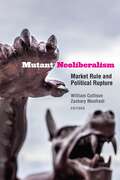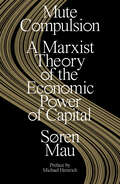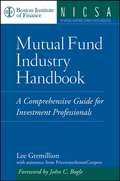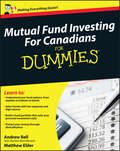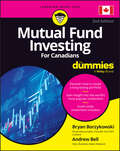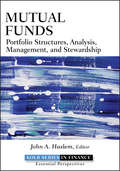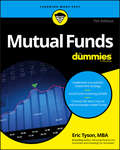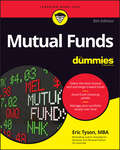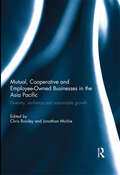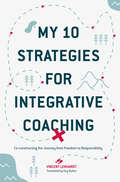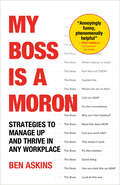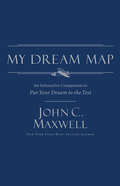- Table View
- List View
Mut zu Inner Work – die Hindernisse zur Transformation überschreiten: Ein Leitfaden zur Veränderungsbegleitung in Organisationen
by Andrea HötgerDieses Fachbuch geht der Frage nach, wie Transformationen in Organisationen gelingen können und welche Art der Begleitung und Interventionen es dazu braucht. Wenn wir andere dazu anregen möchten, reifer, dynamischer und selbstorganisierter zu agieren, geht das mit „Inner Work“. Tiefgreifende Veränderung braucht eine Hinwendung zu inneren, unbeachteten Aspekten und erweiterten Perspektiven. Es gilt, die Schwellen des Autopilots und Schutzmechanismen zu überschreiten. Dieses Buch hält die Lupe darauf, was Coaches/Berater*innen, Führungskräfte und Teamentwickler*innen in Transformationsprozessen benötigen, um professionell zu intervenieren.Die Autorin geht entsprechend des Modells der „Glaubenspolaritäten“ nach Matthias Varga von Kibéd vor: Es wird zunächst das Wissen über Transformationen vorgestellt und mögliche Hindernisse auf den Ebenen des Individuums, eines Teams oder einer Organisation beschrieben. Da die Basis jeglicher Transformation einepsychologische Sicherheit der Betroffenen ist, werden im zweiten Schritt (Vertrauen) wichtige Grundlagen vorgestellt, um als Begleitung in Transformationsprozessen eine förderliche Haltung dem Beratungssystem gegenüber einzunehmen. Im dritten Schritt (Handlung) geht es um die Praxis der Begleitung: Welchen Rahmen und welche Interventionen werden gesetzt? Unter dem Stichwort Weisheit werden wichtige Zutaten für professionelles Handeln in Transformationsprozessen dargestellt, die für die Autorin als zu pflegende Basis für Inner Work gelten. Der InhaltWissen: Transformationen, Hemmschwellen und Inner Work als TransformationsarbeitVertrauen: Psychologische Sicherheit fördernHandeln: Neues Denken, Fremdes vertraut machenWeisheit: Kontingenz, Resonanz, Emergenz und Vertrauen schaffen
Mut zu Innovationen: Impulse aus Praxis, Forschung, Beratung und Ausbildung
by Wolfgang SchollLernen Sie in diesem Buch über Innovationen, wie Sie Ihr Innovationsmanagement praktisch verbessern könnenUmfragen in über 100 Unternehmen haben gezeigt, dass zwar immer öfter Innovationen entwickelt und begonnen werden, in den meisten Fällen verlaufen diese Projekte aber erfolglos. Das Problem ist, dass Innovationen zu verschieden und komplex sind, um sie nach einem bestimmten Schema und Checklisten durchführen zu können. Dieses Buch über Innovationen hilft Ihnen daher dabei, das Innovationsmanagement in Ihrem Unternehmen effektiver zu gestalten, indem es Handlungsempfehlungen liefert und förderliche Organisationsstrukturen vorstellt. Wie wird erfolgreiches Innovationsmanagement umgesetzt?Der Herausgeber Wolfgang Scholl berücksichtigt aktuelle wissenschaftliche Forschungen und Meinungen. Gleichzeitig schlägt er aber auch die Brücke zur Praxis, indem er eine Vielzahl an Fallbeispielen und Erklärungsmodellen liefert. Eine Online-Befragung zu diesem Thema zeigt, wie andere Unternehmen vorgehen und präsentiert gute und schlechte Beispiele. Konkrete Handlungsempfehlungen sollen die Innovationskraft eines Unternehmens steigern.Die Inhalte im ÜberblickFolgende Inhalte thematisieren die Autoren in diesem Innovations-Buch:• Treiber und Hemmnisse bei Innovationsprojekten• Methoden der Innovationsfindung• Nutzen und Probleme bei Innovationspromotern und -beratung• Innovation von Fall zu Fall• Objektive Ideenbewertung• Auswertung und Interpretation von Innovationsdaten• Innovationsprozesse vorantreiben• Erfolgsprinzipien und Probleme bei InnovationenDie zweite Auflage dieses Arbeitsbuches beinhaltet die neusten Forschungsarbeiten zu diesem Thema und geht auf aktuelle Entwicklungen ein.
Mutant Neoliberalism: Market Rule and Political Rupture
by William Callison and Zachary ManfrediTales of neoliberalism’s death are serially overstated. Following the financial crisis of 2008, neoliberalism was proclaimed a “zombie,” a disgraced ideology that staggered on like an undead monster. After the political ruptures of 2016, commentators were quick to announce “the end” of neoliberalism yet again, pointing to both the global rise of far-right forces and the reinvigoration of democratic socialist politics. But do new political forces sound neoliberalism’s death knell or will they instead catalyze new mutations in its dynamic development?Mutant Neoliberalism brings together leading scholars of neoliberalism—political theorists, historians, philosophers, anthropologists and sociologists—to rethink transformations in market rule and their relation to ongoing political ruptures. The chapters show how years of neoliberal governance, policy, and depoliticization created the conditions for thriving reactionary forces, while also reflecting on whether recent trends will challenge, reconfigure, or extend neoliberalism’s reach. The contributors reconsider neoliberalism’s relationship with its assumed adversaries and map mutations in financialized capitalism and governance across time and space—from Europe and the United States to China and India. Taken together, the volume recasts the stakes of contemporary debate and reorients critique and resistance within a rapidly changing landscape.Contributors: Étienne Balibar, Sören Brandes, Wendy Brown, Melinda Cooper, Julia Elyachar, Michel Feher, Megan Moodie, Christopher Newfield, Dieter Plehwe, Lisa Rofel, Leslie Salzinger, Quinn Slobodian
Mute Compulsion: A Marxist Theory of the Economic Power of Capital
by Søren MauA new Marxist theory of the abstract and impersonal forms of power in capitalismDespite insoluble contradictions, intense volatility and fierce resistance, the crisis-ridden capitalism of the 21st century lingers on. To understand capital&’s paradoxical expansion and entrenchment amidst crisis and unrest, Mute Compulsion offers a novel theory of the historically unique forms of abstract and impersonal power set in motion by the subjection of social life to the profit imperative. Building on a critical reconstruction of Karl Marx&’s unfinished critique of political economy and a wide range of contemporary Marxist theory, philosopher Søren Mau sets out to explain how the logic of capital tightens its stranglehold on the life of society by constantly remoulding the material conditions of social reproduction. In the course of doing so, Mau intervenes in classical and contemporary debates about the value form, crisis theory, biopolitics, social reproduction, humanism, logistics, agriculture, metabolism, the body, competition, technology and relative surplus populations.
Mutmacher: Unternehmen stärken durch mutige Führung
by Michael KresDieses Buch zeigt, wie man ein Unternehmen so transformiert, dass die Firma und die Mitarbeitenden von den Veränderungen tatsächlich profitieren und das Unternehmen mutig und erfolgreich bleibt. Es ist gleichzeitig Anleitung und Erfahrungsbericht: von Unternehmern für Unternehmer, für Manager, Leader und Organisationsentwickler.In jedem Unternehmen steckt enormes, ungenutztes Potenzial. Potenzial, das Unternehmen brauchen, um in stets anspruchsvolleren Märkten zu überleben. Was fehlt, so Michael Kres, ist vor allem eines: Mut. Sein Buch befasst sich mit mutigen Ansätzen, die es ermöglichen, dieses Potenzial zu entfesseln und Unternehmen in unplanbaren Zeiten produktiver und menschlicher zu machen. Die dritte Auflage wurde um neueste organisationspsychologische Erkenntnisse, Impulse aus Unternehmen weltweit sowie neue Fallstudien und Interviews aus mutigen Unternehmen ergänzt.
Mutterschaft und Wissenschaft: Die (Un-)Vereinbarkeit von Mutterbild und wissenschaftlicher Tätigkeit
by Lena Eckert Sarah Czerney Silke MartinDieses Buch versammelt Stimmen von Wissenschaftlerin*innen, die sich in sehr persönlichen Texten mit dem Thema „Kinder haben oder nicht haben (wollen)“ auseinandersetzen. Dabei kreuzen sich Identitätspositionen verschiedener Herrschaftsverhältnisse und führen zu Kollisionen im Privaten und Öffentlichen: Die Autor*innen schreiben über ihre Erfahrungen als Selbstoptimierer*innen, Professor*innen, Aktivist*innen, Haushälter*innen, Partner*innen, Pendler*innen, Töchter, Lebenskünstler*innen, Jongleur*innen und Feminist*innen und über die (Un)Möglichkeiten, all das auf einmal zu sein. Darüber hinaus thematisieren und hinterfragen sie auf vielfältige Art das noch immer vorherrschende Mutterbild in Deutschland. Die Texte kommen aus verschiedenen wissenschaftlichen Disziplinen – aus MINT-Fächern ebenso wie aus Geistes- und Sozialwissenschaften sowie aus der Kunst. Die drei Herausgeberinnen sind in der Wissenschaft tätige Mütter.
Mutual Fund Agent Second Semester FYB.COM New NEP Syllabus - RTMNU: म्युच्युअल फंड एजंट दुसरे सत्र एफ.वाय.बी.कॉम. नवीन एन.इ.पी. अभ्यासक्रम - राष्ट्रसंत तुकडोजी महाराज नागपूर विद्यापीठ
by Dr Prabhakar Motghare Dr Abdul Shakeel Abdul Sattar Dr Rajesh G. Valode'म्युच्युअल फंड एजंट' हे पुस्तक राष्ट्रसंत तुकडोजी महाराज नागपूर विद्यापीठाच्या बी.कॉम. (ऑनर्स/रिसर्च) अभ्यासक्रमाच्या दुसऱ्या सत्रासाठी तयार करण्यात आले आहे. नव्या शैक्षणिक धोरणानुसार तयार केलेल्या या अभ्यासक्रमात म्युच्युअल फंड क्षेत्रातील मूलभूत माहिती, इतिहास, रचना, गुंतवणूक धोरणे, जोखीम व्यवस्थापन, आर्थिक नियोजन, आणि एजंटची भूमिका यांचा सविस्तर अभ्यास दिला आहे. पुस्तकात म्युच्युअल फंड मार्केटमध्ये संशोधन करणे, गुंतवणूकदारांना मार्गदर्शन करणे, योजना सुचवणे, अर्ज प्रक्रिया सुलभ करणे, व्यवहार पूर्ण करणे, आणि दीर्घकालीन ग्राहक संबंध निर्माण करण्याच्या कौशल्यांचा समावेश आहे. यामध्ये फंडांचे प्रकार, व्यवहार प्रक्रिया, केवायसी, कर नियम, गुंतवणूक धोरणे, आर्थिक नियोजनाचे टप्पे आणि संभाव्य गुंतवणूकदारांचे प्रकार समाविष्ट आहेत. हे पुस्तक म्युच्युअल फंड एजंट म्हणून कारकीर्द करण्यासाठी आवश्यक ज्ञान व कौशल्ये विकसित करते, तसेच विद्यार्थ्यांना प्रत्यक्ष प्रशिक्षण आणि मूल्यांकनाचेही संधी देते.
Mutual Fund Industry Handbook
by Lee GremillionInvestors like the fact that mutual funds offer professional management, easy diversification, liquidity, convenience, a wide range of investment choices, and regulatory protection. Mutual Fund Industry Handbook touches on all of those features and focuses on the diverse functions performed in the day-to-day operations of the mutual fund industry.
Mutual Fund Investing For Canadians For Dummies
by Andrew Bell Matthew ElderMutual funds offer investors a diverse portfolio in a single investment, which is critical in an uncertain economy. Although ideal for buyers who don't want to tackle the stock market alone, mutual funds can still be intimidating, with a bewildering array of options. And now that foreign content regulations for RRSPs have been lifted, Canadians have even more choices. Mutual Fund Investing For Canadians For Dummies explains it all, from the basics -- what is a mutual fund? -- to the not-so-basic -- are index funds better than managed funds? Is my MER cutting into my ROI? With information on how mutual funds can be a vital and profitable component of everyone's retirement plans and how they can help readers build their wealth inside their tax-free savings account, this friendly guide offers the principles Canadians need to know in order to be informed and successful mutual fund investors."This book is easy and even fun to read. ... Mutual Fund Investing For Canadians For Dummies is worth the investment if you are looking to build a fund portfolio that suits your needs and will give you healthy, long-term returns."Jeff Dupuis, money.canoe.ca
Mutual Fund Investing For Canadians For Dummies
by Andrew Bell Bryan BorzykowskiSimple information on diversifying your investments with mutual funds With mutual funds, beginning and experienced investors can afford to invest in a wide range of securities by pooling their money with others’ and splitting the profits. Mutual Fund Investing For Canadians For Dummies helps you makes sense of these funds, start investing, and create a plan to meet your financial goals. With this easy-to-understand guide, you can weigh the pros and cons of mutual funds to decide if they’re right for you. Then follow step-by-step instructions for investing your money in reputable funds—with information specific to the Canadian market. Learn what mutual funds are and how they’re different from hand-picking your own stocks and bonds Understand the risks and benefits of mutual funds so you can determine whether they fit with your financial goals Make a solid investment plan and craft your fund portfolio Consider hedge funds and other managed options for rounding out your investment portfolioMutual Fund Investing For Canadians For Dummies is great for beginner investors looking to learn more about the benefits of mutual funds and get up to speed on the latest information.
Mutual Fund Selection: From Theory to Practice
by Moshe Levy Richard RollThe vast majority of investors in the capital market do so, at least in part, via mutual funds. In the US market alone, there are currently thousands of mutual funds to choose from. Thus, the task of mutual fund selection is of central importance. It is a notoriously difficult task, because the past return parameters are very noisy estimates of the future parameters. This book presents the state-of-the-art research in this field. It describes recent academic findings and translates them into practical guidelines for mutual fund selection, and will be of interest to researchers alongside professional investors and fund ranking agencies.
Mutual Funds
by John A. HaslemAn authoritative, must-read guide to making more informed decisions about mutual fundsProviding a balance of theory and application, this authoritative book will enable you to evaluate the various performance and risk attributes of mutual funds. It covers a broad range of topics, including understanding the advantages and disadvantages of mutual funds, evaluating stock/bond allocations within fund portfolios, assessing fund diversification risk, measuring fund returns and risk, and making fund buy/sell decisions.While informative chapters combine clear summaries of existing research with practical guidelines for mutual fund analysis, step-by-step decision checklists guide you through the selection of various mutual funds.Puts the risks and rewards of mutual fund investing in perspectiveSkillfully examines how to select and evaluate the best mutual fundsOutlines mutual fund service advantages and disadvantagesDiscusses the long- and short-term effectiveness of mutual fundsCovering major theoretical and management issues in mutual fund analysis and portfolio management, this book is an authoritative guide.
Mutual Funds For Dummies
by Eric TysonPosition your portfolio for growth with one of America's bestselling mutual fund books Are you looking for a trusted resource to help you add mutual funds to your investment strategy? With straightforward advice and a plethora of specific, up-to-date mutual fund recommendations, personal finance expert Eric Tyson helps you avoid fund-investing pitfalls and maximize your chances of success. Newly revised and updated, Mutual Funds For Dummies quickly and easily helps you pick the best funds, assemble and maintain your portfolio, and evaluate your funds' performance. In no time, it gets you up and running on exchange-traded funds, tax laws affecting investments in funds, how to evaluate different fund-investing strategies, and much more. Plan and implement a successful investment strategy that includes mutual funds Avoid fund-investing pitfalls Find the best-managed funds that match your financial goals Select among mutual funds, exchange-traded funds, and other investing options Complemented with sample fund portfolios and updated forms that show you exactly how to accomplish your financial goals, this is your trusted resource for planning and implementing a successful investment strategy that includes mutual funds.
Mutual Funds For Dummies
by Eric TysonBuild substantial wealth with mutual funds (and ETFs)! Mutual funds and exchange-traded funds (ETFs) are great for professional management, diversification and liquidity into your portfolio, but what are the costs and risks? And how have the best investment strategies changed with the rise of robo-investing, ETFs, and new tax rules? Mutual Funds For Dummies answers all your questions, giving you insight on how to find the best-managed funds that match your financial goals. With straightforward advice and plenty of specific fund recommendations, Eric Tyson helps you avoid fund-investing pitfalls and maximize your returns. This new edition covers the latest investment trends and philosophies, including factor investing, ESG investing, and online investing. You’ll also find completely updated coverage on the best mutual funds and ETFs in each category. Earn more with funds! Learn how mutual funds and ETFs work and determine how much of your portfolio to devote Weigh the pros and cons of funds, and use funds to help you pick your own stocks Make the most of online investing and other new technologies and trends Maximize your gains by choosing the funds and strategies that work for you Mutual Funds For Dummies is a trusted resource, and this update has arrived to help you plan and implement a successful investment strategy. The fund market is rebounding—get on the train and take advantage of the opportunity today!
Mutual Insurance 1550-2015
by Marco H. D. Van LeeuwenIn the modernWestern world, we tend to be insured by the state or for-profit insurers. Wehave privileged this system over mutual or micro-insurance, whose long and richhistory we tend to forget. Yet, mutual and micro-insurance is becomingincreasingly important, both in the Western and in the non-Western world andbears re-examination. This book tracesthe track record of mutual insurance from 1550 to the present, examiningprovisions for burial, sickness, unemployment, old age, and widowhood. Theauthor seeks to address such topics as the type of risks micro-insurancecovered between 1550 and 2015; how it was organized throughout its history; whoprovided the coverage; and how contributions, benefit levels, and conditionshave changed. Importantly, theauthor explores why this system has worked through, and endured, the test oftime. Mutual insurance can, for instance, overcome classic insurance problemssuch as adverse selection and moral hazards. The author demonstrates that thestudy of the position micro-insurance historically assumed in mixed economiesof welfare presents interesting lessons for today's insurance market, as wellas for today's mutualism.
Mutual, Cooperative and Employee-Owned Businesses in the Asia Pacific: Diversity, Resilience and Sustainable Growth
by Chris Rowley and Jonathan MichieThe 25 years leading up to the international financial crisis have been depicted as ‘capitalism unleashed’, containing deregulation, privatisation, demutualisation and financialisation. Yet remarkably, given this economic and political context, co-operatives and mutuals appear to have been gaining ground in many countries, albeit modestly, even before the international financial crisis and the resulting global recession, from which the global economy is still only slowly recovering.The 2007-2008 international financial crisis called into question how appropriate the shareholder-owned model is, certainly if it is allowed to dominate the financial services sector. However the International Co-operative Alliance is determined to make the mutual and co-operative sector of the economy a dynamic, sustainable and increasingly important sector of the global economy. This book looks at the contribution of co-operative, mutual and employee-owned firms to the Asia Pacific economy - both currently and prospectively – and the challenges the standard ‘Western’ model faces regarding employment and output. It also looks at the role of Governments, the nature of co-operatives in China and the role of the state, and the future prospects for cross-border growth of co-operative and mutual business within Asia Pacific, and more widely.This book was originally published as a Special Issue of Asia Pacific Business Review.
Mutualism: Building the Next Economy from the Ground Up
by Sara HorowitzA profound look at the crisis of work and the collapse of the safety net, and a vision for a better way forward, rooted in America&’s cooperative spirit, from the founder of the Freelancers Union &“Read this essential book to see how we can and must build the future.&”—Reid Hoffman, co-founder of Linkedin Mutualism: It&’s not capitalism and it&’s not socialism. It&’s the future. The twentieth century changed every facet of life for American workers: how much they could expect to earn and what they had the right to demand. But by 2027, a majority of Americans—from low-wage service workers to white-collar professionals—won&’t be traditional employees. Benefits like paid sick leave, pensions, 401(k)s, disability insurance, and health care will be nearly extinct. To meet the needs of this new generation of workers, the government has done almost nothing. In this book, labor lawyer, former chair of the board of the New York Federal Reserve, and MacArthur &“genius&” Sara Horowitz brings us a solution to the current crisis of work that&’s rooted in the best of American traditions, which she calls mutualism. Horowitz shows how the future of our economic safety net rests on this approach and demonstrates how mutualist organizations have helped us solve common problems in the past and are now quietly driving rural and urban economies alike all over the world, inspired not by for-profit corporations but by labor unions and trade associations, religious organizations and mutual aid societies, and vital social movements from women&’s suffrage to civil rights. Mutualism is for anyone who feels that the system is not working for them, and is looking for a new way to build collaboratively, create the new American social contract, and prosper in the twenty-first century.
My 10 Strategies for Integrative Coaching
by Vincent LenhardtThis book gives coaches, and all leaders, the wider perspective and the practical tools to help those they work with to achieve deep and lasting change that generates long-term performance. Who we are, and how we relate to others, is a major factor in the sustainable development of organizations and communities today. The helping relationship--whether as coach, manager, trainer, teacher or leader--is central to developing this capacity to relate--not only to others but also to ourselves. This book provides a series of innovative concepts and practical tools for those involved in helping relationships, as they help others develop and transform. It provides five operational strategies that answers the questions "What should I do?" and "How should I do it?". It then offers four strategies to help a person build their own identity. Finally, it describes a "crystallization" strategy that encompasses all the others, and enables a person to crystalize what has been occurring during the helping relationship. It also provides a unique perspective on the place of coaching in the context of the evolution of our species towards an empathetic civilization, of our society to and beyond the third industrial revolution, and of our companies as they reinvent the way they organize in the 21st century to give greater autonomy to those who work in them and harness the power of participative democracy in the workplace. A central theme of the book is freedom and responsibility. Having found, then fully accepted our freedom, we go beyond freedom, and take the path towards responsibility. Both client and coach chart their path on this journey through the alliance they create, and through which deep meaning is born for both.
My Beer Year
by Lucy BurninghamA love note to beer--appreciating the history, craftsmanship, and taste of craft beer as told by a woman striving for beer-expert status. As a journalist spurred by curiosity and thirst, Lucy Burningham made it her career to write about craft beer, traveling to hop farms, attending rare beer tasting parties, and visiting as many taprooms, breweries, and festivals as possible. With this as her introduction, Lucy decided to take her relationship with beer to the next level: to become a certified beer expert. As Lucy studies and sips her way to becoming a Certified Cicerone, she meets an eclectic cast of characters, including brewers, hop farmers, beer sommeliers, pub owners, and fanatical beer drinkers. Her journey into the world of beer is by turns educational, social, and personal--just as enjoying a good beer should be.
My Best Mistake: Epic Fails and Silver Linings
by Terry O'ReillyThe host of CBC Radio’s Under the Influence, Terry O’Reilly, uncovers the surprising power of screwing up The Incredible Hulk was originally supposed to be grey, but a printing glitch led to the superhero’s iconic green colour. NHL hall-of-famer Serge Savard’s hockey career nearly ended prematurely, not because of an injury, but because of an oversight. And the invention of a beloved treat, the Popsicle, began with a simple mistake. In his fascinating and meticulously researched new book, Terry O’Reilly recounts how some of the biggest breakthroughs and best-loved products originated with a mistake. Some people’s “mistakes” led to dramatic life changes--losing their jobs, their companies and often their credibility--only for them to discover new opportunities on the other shore. Other people’s mistakes seemed minor, almost insignificant--until they led to a famous brand, a legendary band or a groundbreaking work of art. And in a few instances, a mistake actually saved lives. The fear of failing often holds us back. My Best Mistake will change how you think about screwing up and will encourage you to accept mistakes and embrace the obstacles that may arise from these errors, leading you to unexpected breakthroughs and silver linings of your own.
My Boss Is a Moron: Strategies to Manage Up and Thrive in Any Workplace
by Ben AskinsA bold, funny, and deeply practical playbook to navigate toxic workplaces, outsmart bad bosses, and take control of your career—no matter who&’s in charge.&“Annoyingly funny, phenomenally helpful&” - Chris DonnellyMy Boss Is a Moron is the book every frustrated employee didn&’t know they were waiting for—a bold, hilarious, and genuinely helpful guide to navigating bad management with your sanity and career intact. It meets you exactly where you are: stuck under leadership that&’s clueless, careless, or downright toxic. And, more importantly, gives you real-life strategies for managing up, recognizing dysfunction, setting boundaries, advocating for yourself, and knowing when it&’s time to walk away. It&’s smart, cathartic, and highly practical—perfect for anyone who&’s ever thought, Is it me? Or is my boss actually the problem?You&’ll be taken through the entire messy lifecycle of working with a boss, from decoding shady job descriptions and awkward interviews to navigating pay rises, promotions, annual leave, and more. Along the way, the book pulls back the curtain on why bosses and companies make the decisions they do (even when they make zero sense) and shows you how to play the game without losing your mind or your momentum.From Forbes 30 Under 30 entrepreneur, serial founder, and one of the fastest-growing voices in workplace culture, Ben Askins pulls from the hundreds of thousands of real workplace stories his fans have shared with him and delivers a sharp, no-BS survival guide for the modern employee—especially when the person in charge has no idea what they&’re doing.
My Bridge to America: Discovering the New World for Minolta
by Sam Kusumoto Edmund MurrayThis is the story of a life that has bridged two cultures, Japanese and American. President of the Minolta Corporation, American distributors of Japan's Minolta cameras and business equipment, Sam Kusumoto has played a leading role in the development of Japan's huge export market to the United States. His autobiography is the Horatio Alger story of a young Japanese salesman who came to America in 1954 with two suitcases full of Minolta cameras and failed to sell a single one for two years. Yet he persisted and eventually succeeded in establishing a major market in this country that has brought sales of Minolta cameras and office equipment in America to $800 million a year. As his personal story unfolds, Sam Kusumoto's autobiography provides a penetrating insight into the close but troubled economic relations between Japan and the United States. Kusumoto brings the much discussed trade imbalance question into clearer focus and tells how he believes the situation can be alleviated. He feels America can best equal and surpass Japan's economic miracle by utilizing methods that American business experts taught Japan during the occupation but which we have neglected to apply at home. Here indeed is a fascinating autobiography and a revealing close-up picture of business relations between America and Japan.
My Deepest Sympathies…: Meaningful Sentiments for Condolence Notes and Conversations, Plus a Guide to Eulogies
by Florence IsaacsNever are we more concerned with getting it right than when writing to one who has suffered a loss. InMy Deepest Sympathies--, letter-writing guru Florence Isaacs guides us through the ins and outs of offering comfort and support with short yet meaningful notes that will long be remembered by their recipients. She offers guidelines for diverse situations, with sample letters to draw on, so that it's easy to strike the appropriate tone every time. Isaacs explains that the individual circumstances help determine what's appropriate to say in a sympathy note, and she provides specific techniques for a wide range of relationships, from the death of a coworker's spouse to the loss of a friend's elderly parent from Alzheimer's. She also addresses complex situations like the death of an ex-wife, an estranged sibling, or a longtime companion. She even includes thoughtful words for the death of a pet. Whether it's for a blank note or a few extra lines on a card, Isaacs's advice runs the gamut from personal to professional. And she explains how to provide real help to the bereaved by making phone calls, running errands, or simply lending an ear. Information on funerals, memorial services, and proper etiquette when someone of a different culture has died will help readers avoid missteps in potentially awkward situations. Isaacs closes with techniques for effective eulogies, plus a special appendix of actual eulogies that illustrate ways in which readers can memorialize a loved one for family and friends. Filled with practical information,My Deepest Sympathies--makes it simple to say and do the right thing at difficult times.
My Desk is Driving Me Crazy: End Overwhelm, Do Less, and Accomplish More
by Sue Rasmussen&“This book will inspire calm, clarity, and pure business sanity . . . for absolutely every worried, exhausted and beautiful entrepreneur that you know&” (Tama Kieves, bestselling author of Inspired & Unstoppable). Entrepreneurs are smart, confident, good at what they do, and help their clients get amazing results. Oftentimes they are busy, stressed, and overwhelmed which holds them back from the success and the difference they really want to make. Traditional time-management approaches encourage entrepreneurs to speed up, fit more in, and be more efficient—so they can cross everything off their to-do list. However, they don&’t stop to consider that maybe they shouldn&’t be trying to do everything on their to-do list in the first place. When you&’re overwhelmed or too busy, focusing on getting more done isn&’t the answer. So what is the answer? In My Desk is Driving Me Crazy you&’ll discover how to easily sort through what is important and what isn&’t—and let the unimportant things go—so you can put your energy on what truly matters to you instead, with ease and clarity. &“A generous work of inspiration . . . Shows us how to find and follow our own kind of simplicity out of the chaos we create. This funny, friendly, smart book is not just about your desk . . . it&’s about clearing your head in anything you do.&” —Barbara Sher, New York Times–bestselling author of It&’s Only Too Late If You Don&’t Start Now &“An enjoyable and accessible guide to clearing the inner and outer clutter that gets in the way of the life for which you&’re longing.&” —Kimberly Schneider, M.Ed., JD, LPC, author of Everything You Need Is Right Here
My Dream Map
by John MaxwellIn Put Your Dream to the Test, Dr. John Maxwell asks you ten powerful questions to determine how your dream can become reality. Now, in My Dream Map, he helps you create a detailed plan with interactive exercises and opportunities for personal exploration that will challenge, inspire, and direct you. This companion to Put Your Dream to the Test will help you uncover, perhaps for the first time, specific steps you can take to stop merely thinking about your dream and start living it. If you want to dig in and do substantial work to make your dream happen, My Dream Map will jumpstart your process. Inside you will find: Innovative exercises and resources to help you achieve your dream An expanded version of the Dream Test found in Put Your Dream to the Test Questions and prompts to guide your steps toward the best path to your dream Reading and interview suggestions for further information and inspiration Journaling space to gather your thoughts and plans all in one place Sometimes all you need to achieve a dream are the belief that you can, the resolve that you will, and the plan to make it happen. You have the dream. This volume can help you create the plan. Use it, develop it, and keep it with you as your guide as you make your dream come true.


